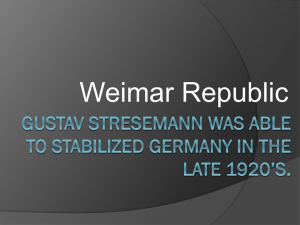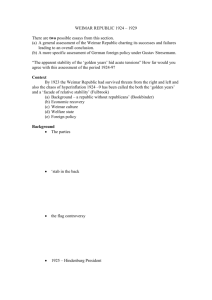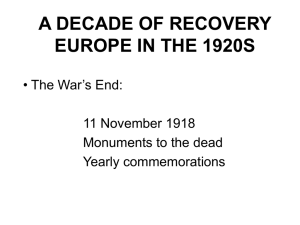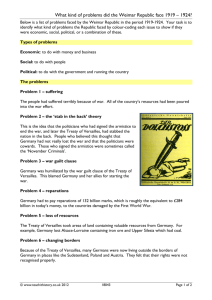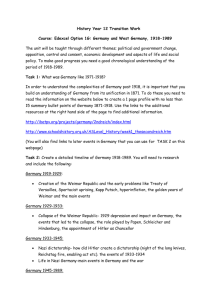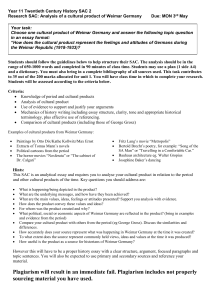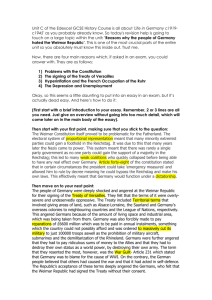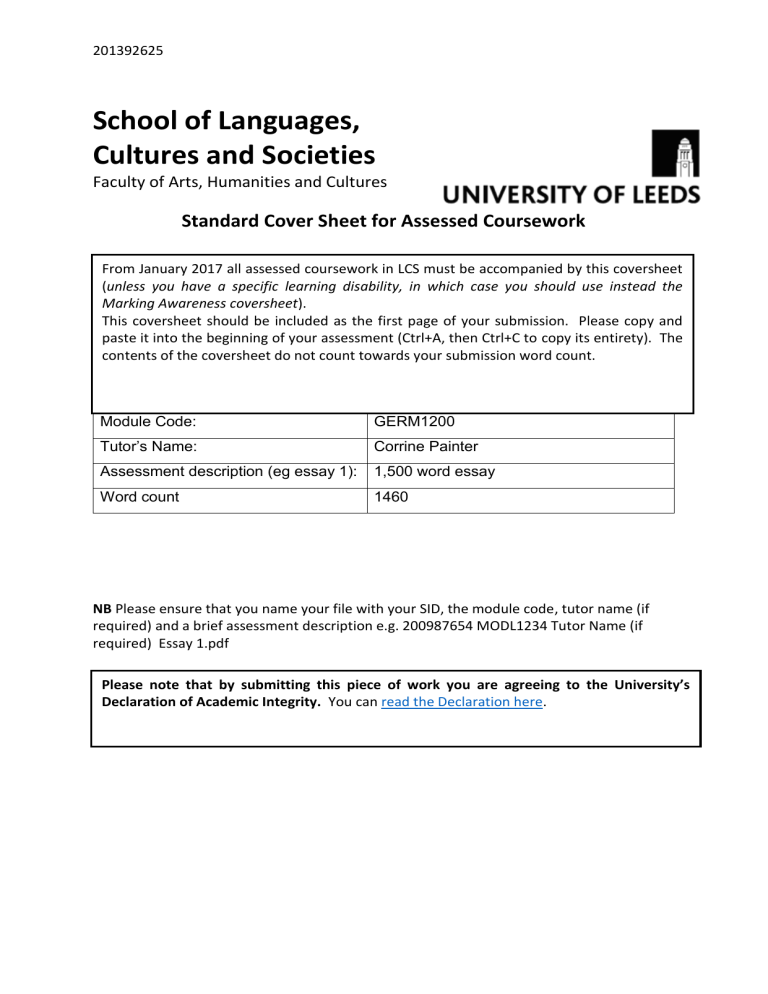
201392625 School of Languages, Cultures and Societies Faculty of Arts, Humanities and Cultures Standard Cover Sheet for Assessed Coursework From January 2017 all assessed coursework in LCS must be accompanied by this coversheet (unless you have a specific learning disability, in which case you should use instead the Marking Awareness coversheet). This coversheet should be included as the first page of your submission. Please copy and paste it into the beginning of your assessment (Ctrl+A, then Ctrl+C to copy its entirety). The contents of the coversheet do not count towards your submission word count. Please complete each of the following sections:Student ID: Module Code: GERM1200 Tutor’s Name: Corrine Painter Assessment description (eg essay 1): 1,500 word essay Word count 1460 NB Please ensure that you name your file with your SID, the module code, tutor name (if required) and a brief assessment description e.g. 200987654 MODL1234 Tutor Name (if required) Essay 1.pdf Please note that by submitting this piece of work you are agreeing to the University’s Declaration of Academic Integrity. You can read the Declaration here. 201392625 WAS THE WEIMAR REPUBLIC DOOMED TO FAIL FROM THE START? The Weimar Republic was doomed to fail from the start due to a number of factors. This was mainly due to the disastrous situation the Republic inherited in Germany due to the collapse of imperial rule in 1918 and the awful conditions Germany was left in at the end of World War One and Weimar’s political structure that caused instability within the government. The high expectations the German public placed on the Weimar Republic, along with unconventional ideas about modernity that Weimar brought also contributed to the inevitability of its demise. One of the factors that was most detrimental to the success of the Weimar Republic was the situation Germany was in at the end of World War One in 1918. After the abdication of Kaiser Wilhelm 11 and the fall of imperial Germany, society was crumbling. The dire conditions of wartime that included widespread famine and poverty had reached unimaginable levels. German war planners had not anticipated the war would last longer than three months therefore did not believe ‘consideration[…]on the supply of food necessary to sustain military or civilian needs,’1 was needed. These conditions led to huge anger and panic amongst the public, evident as the scale of the riots in Berlin meant that government had to be established in Weimar, not the capital. These feelings of inadequacy and resentment from the public meant establishing a successful and long-lasting government already seemed difficult from the outset. Similarly, the outrage over the end of the war caused even more bitter feelings throughout the German population. German 1 Vasick, George, The stab-in-the-back myth and the fall of the Weimar Republic, London: Bloomsbury Academic, 2016 p.10. 201392625 defeat in the war came as a huge shock for both the public and the military alike, with many blaming the government for this. It was popular opinion that if the war had continued without the signing of the armistice, Germany could have won the war. The harshness of the Treaty of Versailles in 1919 also aided public resentment, as many felt the huge reparations, the diminishment of the military and loss of territories were far too harsh on Germany. George Vasick convincingly argues that ‘the contested memory of the war’s end had a profound impact on Weimar politics.’2 The end of the war saw increased militarism and nationalism, and although the defeat should have diminished this, it only made these ideals stronger and further weakened the democracy. Reminiscing about the old days of the empire further amplified the feeling that Germany could have been victorious had they not admitted defeat, resulting in further anger towards the government from the start. Although some were optimistic about this new form of government, Thomas Mergel convincingly argues that ‘the expectation that politics could solve conflicts and create social harmony was profoundly strengthened by the war experience,’3 indicating that the high expectations placed upon the Republic, that were emphasised by the failures of the war, were also partly to blame for its inadequacy. Eric Weitz aids this idea by arguing that ‘World War 1 cast its long shadow over the entire history of the republic.’4 This highlights how the resentment of the end of WW1 made it extremely difficult for the Republic to rectify public opinion and provide the new outlook that society was desperate for; giving it an inability to succeed from the beginning. The ‘stab in the back’ theory, the idea that the Weimar politicians rid the German military of their victory accompanied with anti-Semitic ideas, also 2 Vasick, George, The stab-in-the-back myth and the fall of the Weimar Republic, London: Bloomsbury Academic, 2016 p.3. 3 Mergel, Thomas, ‘High Expectations – Deep Disappointment’ in Weimar Publics, ed. Canning, K, New York; Oxford: Berghahn, 2010, p.194. 4 Weitz, Eric, Weimar Germany: promise and tragedy, Princeton: Princeton University Press, 2013, p.1. 201392625 played a role in public opinion towards the government. The ideas of militarism and nationalism were used along with this theory by many political parties in the Weimar Republic to try and gain support from German citizens and veterans. Parties such as the National Socialists believed ‘the victorious German army was betrayed by a hydra-headed Jewish conspiracy,’5 highlighting how anti-Semitic propaganda was used to further enduce feelings of resentment about the defeat in the war. Vasick convincingly argues that there was an ‘attractiveness to the notion of Stab-in-the-Back,’6 highlighting how this impacted the belief in Weimar from the outset as there were already reasons it shouldn’t be in place and could not be trusted. The political structure of the Weimar Republic was also a contributing factor to its inability to succeed from the beginning. As Germany had only previously had a monarchy, forming a democracy was new territory which already meant Weimar had a disadvantage from the start. The exceeding amount of pressure put on this new government to restore Germany from the disastrous societal conditions during the war as there was widespread famine and social disruption, also made it extremely difficult for it to succeed. Weitz highlights this through the quote ‘the destruction of the old imperial order in war and revolution unleashed the political and social imagination.’7 This indicates that although the promise of a new Germany gave society hope, the high expectations placed on the republic by the political and social imagination of the German citizens set it up for failure. Mergel follows on from this, convincingly arguing that ‘the instability of the Weimar Republic stemmed largely 5 Vasick, George, The stab-in-the-back myth and the fall of the Weimar Republic, London: Bloomsbury Academic, 2016 p.205. 6 Ibid. 7 Weitz, Eric, Weimar Germany: promise and tragedy, Princeton: Princeton University Press, 2013, p.2. 201392625 from the fact that citizen’s expectations of both the political system and its politicians were unrealistically high and were thus essentially doomed to be disappointed.’8 This highlights how the inexperience in democracy in Germany meant reforming the system and pleasing everyone was impossible. The political system put into place by the Republic also had its major faults. The Weimar constitution implemented the system of proportional representation which provided a fair and democratic government. However, although this gave way to a genuine democracy and power of the Reichstag, it had major downfalls. The system of proportional representation meant each party in the Reichstag got the same number of seats in parliament as the number of votes it received. This led to a large number of parties in government at any given time which caused causing major problems when trying to pass legislation. This ultimately led to the formation of a coalition government as parties had to band together in order to secure laws and legislation. This structure seriously weakened the Republic’s power and credibility, and the political systems allowance of all parties gave rise to fascist ones. This ultimately gave way to the Nazi regime that overtook the republic in 1933, and their outlook ‘moved Jews to the centre of all the problems experienced by the republic,’9 showing how the failure of the constituency was easily used as a gateway to anti-Semitism. However, although there were large structural problems with the government, ultimately it was the unrealistic expectations that drove Weimar to failure as it would never have lived up to what society wanted it to be. 8 Mergel, Thomas, ‘High Expectations – Deep Disappointment’ in Weimar Publics, ed. Canning, K, New York; Oxford: Berghahn, 2010, p.192-193. 9 Vasick, George, The stab-in-the-back myth and the fall of the Weimar Republic, London: Bloomsbury Academic, 2016 p.6. 201392625 Similarly, the new age of modernity that arose from the Weimar government hindered its success from the outset. Traditional values about society and culture that Germany had previously employed were challenged throughout the time of the Republic. Corey Ross convincingly argues that this was ‘the most vibrant cultural scene in the world during the 1920s.’10 There was a new outlook on everything, from the Bauhaus movement in architecture, to the form of expressionism in art and film. Women also enjoyed new rights and freedom of liberation, by straying from traditional gender roles many embraced their sexuality and rejected the motherly personality in favour of a glamourous and free one. However, although these new ideals were embraced by some and mainly in Berlin, the overall feeling was that traditional societal and gender roles should be obeyed. This new stance on modernity further drove a large number of the public away from supporting the Weimar government, as they believed this encouragement of liberation was barbaric. This highlights how the changes in terms of culture and society that the Republic tried to make further diminished their support as the extent of change from traditional German values was too high. In conclusion, the Weimar Republic was doomed to fail from the start. This government was rooted in problems from the offset, the destruction of the war left Germany’s people hopeless and angry, desperate for change. The extent of pressure it was under to deliver better conditions for its people were bound to fall short, as it would never live up to them. The resentment from the loss of World War One fell on the government and continued throughout the period, leaving Weimar with very little chance to rectify Germany’s loss in 10 Ross, Corey ‘Cinema, Radio, and “Mass Culture’ in the Weimar Republic: Between Shared Experience and Social Division’, in: John A. Williams, ed, Weimar Culture Revisited, Palgrave, 2011, p.25 201392625 the war. The political structure of the government also aided its imminent failure, although proportional representation was a fair system, it led to difficult and slow decision making that left a lot to be desired. Finally, the modernity that Weimar brought with it was ultimately rejected by the middle classes and elitists, as it strayed too far from traditional values to be accepted. 1460 words 201392625 BIBLIOGRAPHY: Mergel, Thomas, ‘High Expectations – Deep Disappointment’ in Weimar Publics, ed. Canning, K, New York; Oxford: Berghahn, 2010 Ross, Corey ‘Cinema, Radio, and “Mass Culture’ in the Weimar Republic: Between Shared Experience and Social Division’, in: John A. Williams, ed, Weimar Culture Revisited, Palgrave, 2011. Vasick, George, The stab-in-the-back myth and the fall of the Weimar Republic, London: Bloomsbury Academic, 2016 Weitz, Eric, Weimar Germany: promise and tragedy, Princeton: Princeton University Press, 2013
